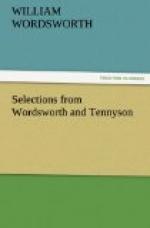CXXIII
There rolls the deep where grew the tree.
O earth, what changes hast
thou seen!
There where the long street
roars hath been
The stillness of the central sea.
The hills are shadows, and they flow
5
From form to form, and nothing
stands;
They melt like mist, the solid
lands,
Like clouds they shape themselves and
go.
But in my spirit will I dwell,
And dream my dream, and hold
it true; 10
For tho’ my lips may
breathe adieu,
I cannot think the thine farewell.
WORDSWORTH
WILLIAM WORDSWORTH
BIOGRAPHICAL SKETCH
William Wordsworth was born at Cockermouth, Cumberland, on April 7th, 1770. His father, John Wordsworth, was the agent of Sir J. Lowther, who later became the first Earl of Lonsdale. At the age of eight the boy was sent to school at Hawkshead. The impressions of his boyhood period are related in the autobiographical poem, The Prelude, (written 1805, published 1850), and from this poetical record we discern how strong the influences of Nature were to shape and develop his imagination. Wordsworth’s father died in 1783, leaving the family poorly provided for. The main asset was a considerable claim upon the Earl of Lonsdale, which that individual refused to pay. On his death, in 1802, the successor to the title and estates paid the amount of the claim in full with accumulated interest. In the interval, however, the Wordsworth family remained in very straitened circumstances. Enough money was provided by Wordsworth’s guardians to send him to Cambridge University In 1787. He entered St. John’s College, and after an undistinguished course graduated without honors in January, 1791. His vacations were spent chiefly in Hawkshead and Wales, but one memorable vacation was marked by a walking excursion with a friend through France and Switzerland, the former country then being on the verge of revolution.
Shortly after leaving the University, in November, 1791, Wordsworth returned to France, remaining there until December of the following year. During this period he was completely won over to the principles of the revolution. The later reaction from these principles constituted the one moral struggle of his life.
In 1793 his first work appeared before the public—two poems, entitled The Evening Walk and Descriptive Sketches. Coleridge, who read these pieces at Cambridge, divined that they announced the emergence of an original poetical genius above the horizon. Readers of the poems to-day, who are wise after the event, could scarcely divine as much. At about this period Wordsworth received a bequest of 900 pounds from Raisley Calvert, which enabled him and his sister Dorothy to take a small cottage at Racedown in Dorsetshire. Here he wrote a number of poems in which he worked off the ferment of his revolutionary ideas. These ideas can scarcely be said to have troubled him much in later years.




